2010 Toyota 4Runner Service, Tires & Repairs
Get Started
Complete Auto Care for Your 2010 Toyota 4Runner
-
TIRES FOR YOUR 2010 Toyota 4Runner View Tire Info GET TIRE PRICING
-
REPAIR FOR YOUR 2010 Toyota 4Runner View Repair Info SCHEDULE REPAIR
-
MAINTENANCE FOR YOUR 2010 Toyota 4Runner View Maintenance Info SCHEDULE MAINTENANCE
-
OFFERS FOR YOUR 2010 Toyota 4Runner Limited Time Tire Offers VIEW ALL COUPONS
2010 Toyota 4Runner Tires
Recommended Tires | Tire Information
2010 Toyota 4Runner Tires Sizes, Speed Ratings, and Inflation
Not sure about your 2010 Toyota 4Runner tire size? Use the following chart to find information on tire size, speed rating, and inflation.
| Trim Level | Speed Rating | Inflation in PSI F/R | Tire Size |
|---|---|---|---|
| 2010 Toyota 4Runner Trail | S | 32 PSI/32 PSI | P265/70R17 |
| 2010 Toyota 4Runner SR5 | S | 32 PSI/32 PSI | P265/70R17 |
| 2010 Toyota 4Runner Limited | H | 32 PSI/32 PSI | P245/60R20 |
|
2010 Toyota 4Runner Trail Speed Rating: S Inflation F/R: 32 PSI/32 PSI |
|
2010 Toyota 4Runner SR5 Speed Rating: S Inflation F/R: 32 PSI/32 PSI |
|
2010 Toyota 4Runner Limited Speed Rating: H Inflation F/R: 32 PSI/32 PSI |
* Note: these models have different tire sizes depending on vehicle options.
Recommended Tires for Your 2010 Toyota 4Runner
What tires are best for a 2010 Toyota 4Runner? Check out the following tire brands and types.
 ALENZA AS ULTRA
ALENZA AS ULTRA
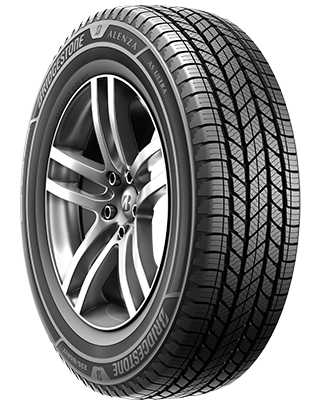
- No warranty
- All-Season
- Light Truck Tires
 Blizzak DM-V2
Blizzak DM-V2
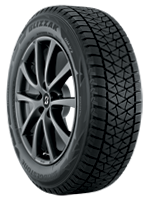
- No warranty
- Winter
- Winter
 Dueler H/T 684 II
Dueler H/T 684 II
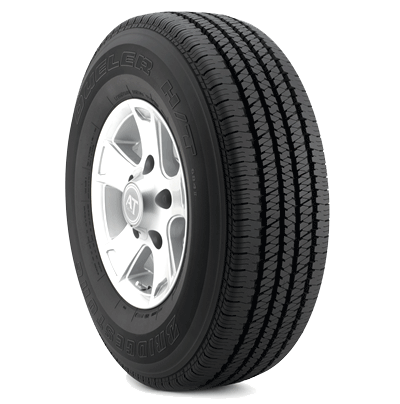
- Platinum Pact Limited Warranty
- All-Season
- Light Truck Tires
 Dueler A/T Revo 3
Dueler A/T Revo 3
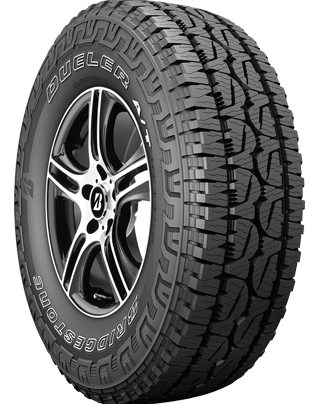
- Platinum Pact Limited Warranty
- All-Season
- Light Truck Tires
 Dueler A/T Revo 3 - LT
Dueler A/T Revo 3 - LT
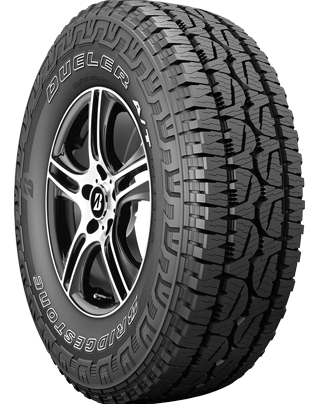
- Platinum Pact Limited Warranty
- All-Season
- Light Truck Tires
 Dueler A/T RH-S
Dueler A/T RH-S
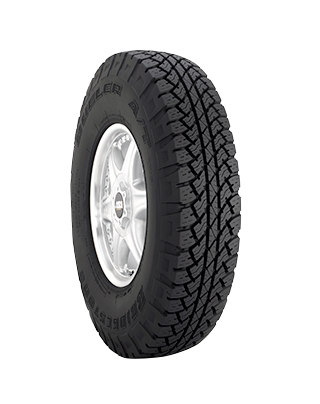
- Platinum Pact Limited Warranty
- All-Season
- Light Truck Tires
 Destination A/T2
Destination A/T2
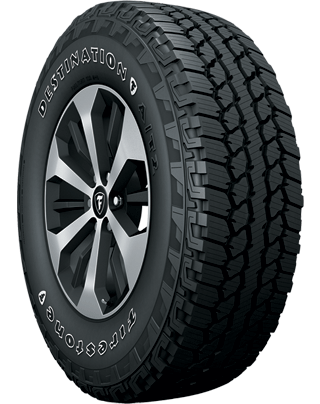
- Gold Pledge Limited Warranty
- All-Season
- Light Truck Tires
 Destination LE3
Destination LE3
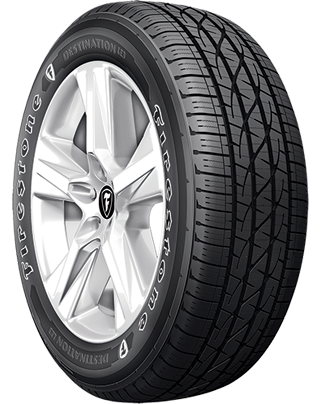
- No warranty
- All-Season
- Light Truck Tires
 Destination X/T
Destination X/T
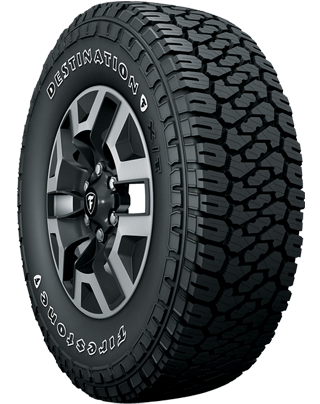
- Gold Pledge Limited Warranty
- All-Season
- Light Truck Tires
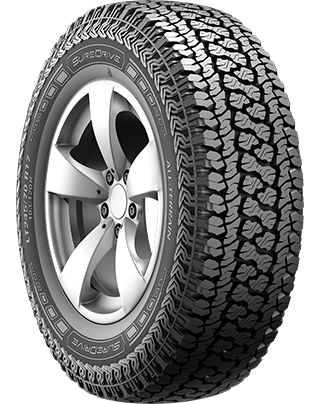
- No warranty
- All-Season
- Light Truck Tires
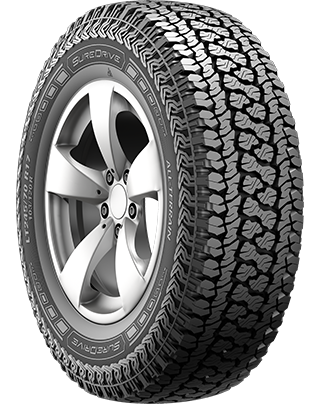
- No warranty
- All-Season
- Light Truck Tires
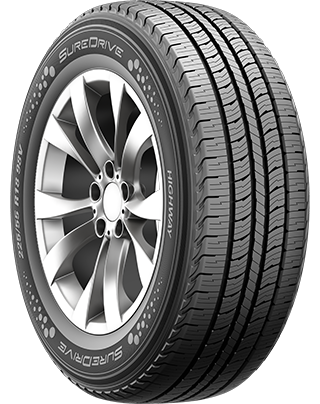
- No warranty
- All-Season
- Light Truck Tires
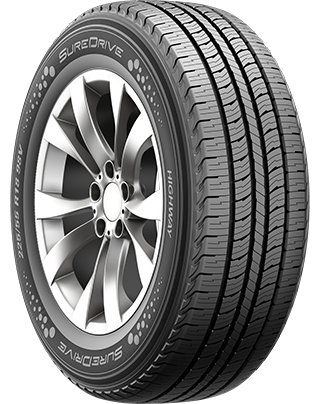
- No warranty
- All-Season
- Light Truck Tires
 OPEN COUNTRY A/T III
OPEN COUNTRY A/T III
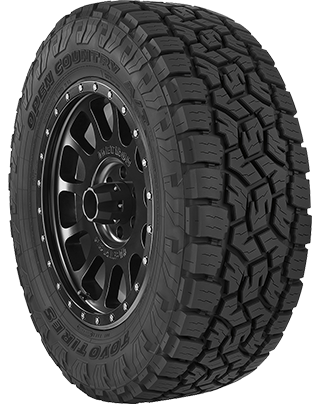
- No warranty
- All-Season
- Light Truck Tires
About 2010 Toyota 4Runner Tires
Apart from finding the right tire size, you also want to consider a handful of other factors when buying new Toyota 4Runner tires like how and where you drive, and how much you want to spend. When evaluating your driving conditions, think about where you live (countryside vs. city vs. mountains) and the kind of unexpected weather you're likely to experience. Drivers in states that fully experience all four seasons often buy two sets of tires: one for summer and one for winter. Other drivers buy one set of all-season tires instead. That way they don't have to return to the tire shop and their vehicle is always ready for sun, rain, and light snow!
Your personal driving style is the next factor to consider. If you're a big off-roading fan who forges paths where others can't, you have very different needs than a long-distance commuter who sticks to the highway. Browse Toyota 4Runner tires online or come to your nearby Firestone Complete Auto Care for help selecting the tire that's right for you.
2010 Toyota 4Runner Tire Installation & Rotation
Firestone Complete Auto Care installs more tires on more cars than most other companies. We're your tire shop and a complete service center for tire installation, maintenance, repair, rotation, and alignment! Buy 2010 Toyota 4Runner tires online and schedule your installation when it's convenient for you.
2010 Toyota 4Runner Tire Questions
-
Is Toyota tire inflation important? Even a tiny decrease in tire pressure could impact your safety and fuel economy. Maintaining proper tire pressure can help increase fuel economy, improve braking time, and boost tire lifespan.
-
What do the tire sidewall numbers mean for my Toyota 4Runner? Your tire sidewall gives you information about load carrying capacity, speed rating, treadwear, traction, and tire size. Talk to one of our tire technicians to learn how to read the numbers on your tire!
-
Is there an easy way to check Toyota tire tread depth? Stay on top of your tire tread depth to help avoid a dangerous drive. You can check tread depth with a penny. Hold the penny so that Abraham Lincoln is facing you, then place your penny into a tread groove upside down. If you can see the top of Abe’s head, your tread is shallow and it might be time for new Toyota 4Runner tires. Grab a penny. Hold the so that Abe Lincon's head is facing you and his hair is pointing toward the ground. Then, place the penny into a tread groove. If you can see the top of Abe’s head, your tread is shallow and it might be time for new Toyota 4Runner tires.
2010 Toyota 4Runner Repair
When to repair, when to replace? Click on a repair below to learn more about Toyota 4Runner repairs at Firestone Complete Auto Care.
Get Repairs for Your 2010 Toyota 4Runner
Car repairs: for many drivers, that phrase is a dreadful one. We’re here to change that, though. At Firestone Complete Auto Care, we want to make car repair painless and hassle-free. When you come to us for 2010 Toyota 4Runner repair services, rest easy knowing that your 4Runner is in capable hands. We’ll start by assessing what repairs may be needed, and we’ll provide you with a detailed explanation of what we recommend. We value your trust, so we recommend only the repairs we think are necessary for your safety on the road.
How Much Are Toyota 4Runner Repairs?
Several factors can affect the cost to repair your 2010 Toyota 4Runner, including what kind of repair you need, costs of replacement parts or repair supplies, the labor involved, and your locale. But no matter your location, you may be able to save money with one of our many auto repair coupons or offers.
A few different aspects can influence repair costs for your 2010 Toyota 4Runner, like
Questions About 2010 Toyota 4Runner Auto Repairs
-
Do I still need scheduled maintenance even when nothing is wrong with my Toyota? One of the best ways to prevent 2010 Toyota 4Runner repairs is by staying on top of your Toyota maintenance schedule. This schedule is written by the people who made your vehicle and they know best how to keep it running smoothly.
-
What's wrong if something feels 'off' in my Toyota? You’re in your car, day in and day out. So, it’s only expected that you know your car better than anyone else! If you notice mysterious smells, strange engine noises, or other out-of-the-ordinary symptoms while driving, trust your instincts and stop into Firestone Complete Auto Care for a Courtesy Check. Catching a potential issue early could help prevent Toyota 4Runner repairs.
-
Why do you recommend certain repairs for my Toyota? Trust is more than just a saying on the wall. It’s a window underneath it. That’s why we won’t recommend services or repairs for your 2010 Toyota 4Runner unless we think they’re vital to your safety on the road.
Brake Repair for Your 2010 Toyota 4Runner
You might have a strong and reliable engine in your Toyota 4Runner. But if you can’t stop it, it’s as good as scrap metal. Don't wait if you're experiencing brake squeaks or a loss of braking power. Safe driving is difficult when your brakes are anything but their best. Plus, waiting can lead to more expensive parts wearing out and requiring replacement. Go to your local Firestone Complete Auto Care for 2010 Toyota 4Runner brake repairs. Our brake repair services include brake pad/shoe replacement, rotor/drum resurfacing, brake fluid exchange, and brake caliper and wheel cylinder service.
Toyota 4Runner Brakes Frequently Asked Questions
-
What is causing my 4Runner to shake when I brake? Your 4Runner could shake when you brake due to worn brake pads or rotors, warped rotors, loose or worn suspension components, or faulty brake calipers. You can always schedule a free brake inspection at the first sign of strange brake behavior.
-
How often do I need to replace my 4Runner brake pads? Brake pads typically last about 30,000 to 40,000 miles. However, driving conditions can affect this range. Sticking to highway driving and braking smoothly can help extend the life of your brake pads, while towing heavy loads or frequently riding your brakes can shorten it.
-
Is it bad if my 4Runner is leaking brake fluid when off? Because your 4Runner brake system is a closed hydraulic system, it should not leak brake fluid. However, if components in your brake system have worn out or been damaged, it might cause brake fluid to leak.
When to Get Toyota 4Runner Drivetrain Repairs
You don't want to go to just anyone for drivetrain repair. Drivetrains for front, rear, and all-wheel-drive and 4WD vehicles are all different. You want to come see the technicians at Firestone Complete Auto Care. We can take care of most 2010 Toyota 4Runner drivetrain components Your Toyota could be crying out for driveshaft repair if you notice clunks when shifting, vibration as your vehicle accelerates, resistance when turning, or heavy vibrations in your floorboards.
2010 Toyota 4Runner Drivetrain Questions
-
What are signs my Toyota drivetrain is damaged? Your Toyota 4Runner drivetrain might be damaged if you notice strange noises from the rear of your vehicle, see fluid leaking, or have issues turning.
-
Why is the malfunction indicator light (MIL) on in my 4Runner? Engine problems, transmission problems, faulty sensors, electrical issues, misfire issues, and connector problems could all cause your 4Runner’s malfunction warning light, or better known as the check engine light, to illuminate.
-
Is a drivetrain malfunction in my 4Runner serious? If you experience a drivetrain malfunction in your 4Runner, it is important to have it inspected by a professional mechanic as soon as possible to identify the underlying cause and perform the necessary repairs. Driving with a malfunctioning drivetrain can be dangerous and cause further damage to your car.
Wheel Alignment for 2010 Toyota 4Runner
Alignment services involve precise adjustments to your Toyota 4Runner’s suspension system, the connection between the vehicle and the wheels. When your car has an alignment service, calculated changes are made to the angles of your tires. This is so that your tires hit the road at an optimal angle for your vehicle’s performance — just as Toyota intended. When you bring in your 2010 Toyota 4Runner, we’ll perform an alignment check first. If needed, we'll adjust your wheel alignment angles to match Toyota recommendations.
Toyota 4Runner Alignment Questions
-
How can I avoid knocking my Toyota 4Runner out of alignment? Potholes and uneven roads can knock your car out of alignment, so stay aware of the road ahead and adjust your speed (or avoid these obstacles whenever it’s safely possible).
-
How frequently should you get a wheel alignment for your 4Runner? Typically, your alignment should be checked every 6,000 miles or 6 months, whichever comes first. Double-check your 4Runner owner’s manual for Toyota's exact recommended schedule.
-
Do you need to get your 4Runner wheels aligned when you get new tires? While you don’t necessarily need to get an alignment when putting new tires on your 4Runner, it’s still a good idea. Ensuring your wheels are properly aligned can help support optimal handling, tire wear, and fuel efficiency.
2010 Toyota 4Runner Engine Repair
When your Toyota 4Runner engine needs repairs, our expert techs will let you know what needs to be done and why before they get started. We don't start working until we have your approval. If a service can wait, we’ll make sure you know. But if immediate repairs are necessary for your safety, we’ll make sure that's clear, too. We want to provide you with the information you need to make an informed engine repair decision. Choose Firestone Complete Auto Care for Toyota 4Runner engine repairs and you can feel good knowing that we only use Toyota-compliant replacement parts such as the timing belt, oil gasket, sensors, or another part.
Questions About 2010 Toyota 4Runner Engines
-
Why does my 4Runner’s check engine light come on when I start it? It’s usually normal for your check engine light to turn on upon ignition. This is just your 4Runner testing its circuits. The dash light shouldn't stay on. If it does, you might want to bring your vehicle in for service.
-
Why is my Toyota 4Runner making engine noise? Unusual noises can signal a problem with your Toyota 4Runner engine. Tapping or knocking could mean you're low on oil. Whistling could mean a belt is misaligned or there's an intake leak. Squealing can indicate a loose fan belt, and grinding might be coming from the brakes, not the engine.
-
Are you unknowingly damaging your Toyota 4Runner engine? Certain driving habits can damage your engine and should be avoided. These habits include 'running on fumes,' revving the engine while still in Park, or pushing 'the pedal to the metal' before the engine has warmed up. Help sustain your engine’s performance and efficiency by staying miles away from these bad driving practices.
2010 Toyota 4Runner Tire Repair
If the road has been rough on your 2010 Toyota 4Runner tires, Firestone Complete Auto Care can help. There’s a chance your tire could be plugged and patched (rather than replaced). Our technicians can inspect your tire and let you know if it is safe to repair. We'll start by evaluating the state of wear, the location of damage, type of damage, and the size of the damage.
If your 2010 Toyota 4Runner tire puncture can be repaired, the repair process is actually fairly simple: (1) Remove the tire from the wheel for inspection and repair, (2) use a filler to close up the puncture (this is to keep moisture from getting in), and (3) seal the inner liner with a repair unit to prevent air loss.
Frequently Asked Toyota 4Runner Tire Repair Questions
-
How soon should I have my flat tire repaired? Driving on a flat tire is not a good idea. Your 4Runner engine will keep running with a flat tire, but you could damage your wheel by continuing to drive on a flat.
-
Can I use an emergency/temporary sealant to fix my Toyota's flat tire? Fast fixes are a mixed blessing. They’ll help you get your Toyota 4Runner to Firestone Complete Auto Care, but don’t count on them to keep you on the road for very long. Using a temporary sealant may also void a Bridgestone or Firestone tire warranty.
-
What can cause 4Runner tires to keep losing air? If your 4Runner tires are always losing air, you may have a puncture, damaged wheel, or leaking valve stem.
Maintenance for Your 2010 Toyota 4Runner
Take care of your Toyota 4Runner and it'll take care of you. With the right maintenance at the right time, your 4Runner has a good chance of hitting 200,000 miles or more.
2010 Toyota 4Runner Maintenance Schedule
What is the manufacturer recommended maintenance schedule for a 2010 Toyota 4Runner? Find maintenance info for your vehicle.
Guide to 2010 Toyota 4Runner Scheduled Maintenance
It can be overwhelming, but fortunately, there’s a resource that takes the guesswork out of routine 4Runner maintenance. Rely on the recommended maintenance schedule that’s been created just for your 2010 Toyota 4Runner! This recommended maintenance schedule is written by the auto manufacturer, Toyota themselves. Scheduled maintenance services can vary depending on driving conditions, climate, and other factors; however, there’s a good chance that your vehicle’s recommended maintenance services will include fluid exchanges, filter changes, new brake pads, oil changes, and tire rotations. Keeping up with routine service appointments is a great way to keep your 4Runner running for longer, decrease your risk of dangerous malfunctions on the road, and help you avoid expensive repairs caused by 2010 Toyota 4Runner problems later.
Overview of Essential Toyota 4Runner Maintenance Needs
Head to your nearest Firestone Complete Auto Care in your 2010 Toyota 4Runner for factory-recommended routine maintenance and a skilled technician will start the appointment with a Courtesy Check. A Courtesy Check helps "set the stage" for your service and catch any small problems before they turn into big repairs. Each Courtesy Check includes a free battery test and an inspection of your 4Runner's windshield wiper blades, head and tail lights, filters, fluid levels, tires, and alignment.
Firestone Complete Auto Care is your spot for 2010 Toyota 4Runner maintenance. We can help you keep your vehicle (and your life!) running smoothly. Many of our locations have weekend and evening hours for your convenience.
Questions About 2010 Toyota 4Runner Maintenance
-
What do I do if I hit a pothole in my Toyota 4Runner? Watch out for pothole damage. If your 2010 4Runner is pulling to one side or the other, your tires or suspension system could be calling out for help.
-
When does my Toyota 4Runner need high mileage oil? Got 75,000+ miles on the odometer? Consider high mileage motor oil. High mileage oil is formulated to address the specific problems encountered by high mileage vehicles, or those with more than 75,000 miles. It can help reduce oil consumption, smoke, and emissions from older Toyota 4Runner engines.
-
Can Toyota dashboard warning lights wait? It's better to get them addressed as soon as possible. An illuminated dashboard light means something in your vehicle isn't functioning like it should. Letting problems linger can mean bad news for your Toyota 4Runner, so be sure to take your car in for service as soon as you notice an illuminated dashboard light.
The Right Battery Size for a 2010 Toyota 4Runner
Need more info about Toyota 4Runner batteries?
| Battery | Engine | Warranty | Cold Cranking Amps | |
|---|---|---|---|---|
| 27F-3 | L4/2.7L | Replacement 24 months | Performance months | 710 |
| 24F-6 | L4/2.7L | Replacement 36 months | Performance months | 750 |
| 24F-RP | L4/2.7L | Replacement 48 months | Performance months | 750 |
| 24F-3 | V6/4.0L | Replacement 24 months | Performance months | 650 |
| 35-2 | V6/4.0L | Replacement 36 months | Performance months | 640 |
| 24F-RP | V6/4.0L | Replacement 48 months | Performance months | 750 |
2010 Toyota 4Runner Car Batteries
Generally, car batteries last from three to five years. You want to replace your 2010 Toyota 4Runner battery before it fails and leaves you stranded. Watch for signs that your current battery is getting too old or too weak. A slow engine crank, an illuminated battery or check engine light, swollen battery case, corrosion-covered posts, or faded headlights can all signal that your battery is waving goodbye.
You can also get a Free Battery Test at your local Firestone Complete Auto Care. Stop by for a free battery test and, if necessary, a battery replacement to help keep your 2010 Toyota 4Runner running! Automotive batteries are just one of our many areas of expertise. Our technicians are familiar with Toyota-specific recommendations for 4Runner battery CCAs and reserve capacity. Get help choosing the battery size that matches your vehicle, and schedule a weekday or weekend battery replacement service for your car.
Answers to Your Toyota 4Runner Car Battery Questions
-
Why won’t my Toyota 4Runner battery hold a charge? A battery is in its final hour when it will no longer hold a charge. The battery may be too old. Or, you may have been leaving your car doors ajar and the cabin light at night. Stop by for a complimentary battery check at your favorite Firestone Complete Auto Care and get a handle on your car battery’s health.
-
How long do car batteries last? Car battery lifespan varies depending on a few factors, including driving conditions, accessories, how well it’s maintained, and the type of battery. On average, a car battery lasts about three to five years.
-
What is the white, crusty substance accumulating on my 4Runner’s battery post? A chemical reaction between battery acid and the air can cause a white, crusty buildup to form on the terminals of your 4Runner car battery. This buildup — known as corrosion — can impede the flow of electricity and cause a range of issues, from poor performance to premature battery failure.
2010 Toyota 4Runner Oil Change Service
Your 2010 4Runner’s oil should be changed according to Toyota’s recommended oil change intervals. Outside of Toyota-recommended oil change intervals, your 4Runner may need an oil change if your check engine light is on, you hear knock knock knock coming from the engine, smell oil inside the car, or notice excess vehicle exhaust. You may also need an oil change more frequently than Toyota recommends if you haul heavy loads, drive in dusty terrain, enjoy off-roading, or go long distances at low speeds.
Your local Firestone Complete Auto Care has the right 2010 Toyota 4Runner motor oil: either synthetic or conventional. Check your owner's manual and talk with a technician to select the right Toyota 4Runner oil, whether it's Quaker State® Advanced Durability™ conventional oil, Pennzoil® High Mileage Vehicle® motor oil, Pennzoil Platinum® Full Synthetic motor oil with PurePlus™ Technology, or Shell Rotella® heavy-duty engine oil. During an oil change, one of our techs will change your 4Runner’s oil, replace and recycle the old oil and filter, inspect all of your other filters, top-off essential fluids, and perform a courtesy inspection on your entire vehicle. Make an appointment for an oil change service today and let the oil experts take care of your 4Runner's engine.
2010 Toyota 4Runner Oil Change Q&A
-
Why is my Toyota 4Runner oil light illuminated? If you’re overdue for an oil change, it might trigger your Toyota 4Runner oil change reminder light. If the oil pressure light is illuminated, it could be due to low engine oil, a failing oil pump, a malfunctioning oil pressure sensor, or a clogged oil filter.
-
How hard is it to change Toyota 4Runner oil at home? Changing engine oil at home isn’t as simple as it’s made out to be. You’ll have to figure out how to properly dispose of the oil and buy special tools. Having your oil changed professionally can not only reduce the risk of something going wrong during the service, but it’ll also help your car perform smoothly down the road.
-
Why is my Toyota 4Runner exhaust smoke grayish or blue? Your engine could be burning oil due to a leak. It may be time for a pro to take a look. A leak can be caused by a variety of issues including faulty valve seals, blown piston rings, or damaged cylinder walls.
Engine Tune-Up Service for Your 2010 Toyota 4Runner
Periodic tune-ups can bring more power back to your 4Runner’s engine. Your nearest Firestone Complete Auto Care location has several options to choose from when it comes to Toyota 4Runner engine tune-up services. One option is the standard Firestone Tune-Up. This includes the installation of new spark plugs and a visual inspection of your engine’s components, plus a lifetime warranty on parts*. Another service option pays special attention to the filters in your 4Runner. Specifically, we replace the fuel filter and air filter. Yet another service is a fuel system cleaning process, which involves removing varnish, dirt, and carbon deposits that have built up inside the fuel injectors, throttle body, and throttle plate in your 4Runner. This goes a long way in boosting your fuel system’s overall performance. Keep in mind that your 4Runner's mileage and maintenance history can uniquely impact its tune-up needs. Chat with a Firestone technician before you jump into a specific service to ensure your engine tune-up money is well-spent.
*Talk to a Firestone Complete Auto Care teammate for full terms and conditions on warranties.
2010 Toyota 4Runner Engine Tune-Up Q&A
-
Will it hurt my Toyota 4Runner to drive with old spark plugs? When it’s time to replace the spark plugs, don’t delay. These small (but vital!) parts provide the electric spark that your car needs in order to start, and old spark plugs can prevent your car from starting at all. Replace spark plugs on time or about every 30,000 miles or so.
-
What should I do if I see leaks under my 4Runner? Puddles could indicate that your vehicle is leaking coolant, oil, or brake fluid. Ignoring these leaks can lead to permanent engine damage, so address these symptoms ASAP with a tune-up service.
-
How frequently do the fuel injectors in my Toyota 4Runner need to be cleaned? There is no hard and fast rule on how often fuel injectors should be cleaned, and it can vary based on driving habits and fuel type. Some manufacturers may suggest including a fuel system cleaning in your regular maintenance schedule. Or you may need to clean your fuel injectors as needed if you notice signs of a fuel system problem.
2010 4Runner Toyota Steering & Suspension Services
During the first few years you had your 2010 Toyota 4Runner, the ride was probably so smooth that you didn’t even think about it! But these days, things are starting to feel a bit rough. Maybe your 4Runner bounces, sways to one side, or makes a weird sound when you drive over a speed bump or turn. The first sign of trouble is the best time to bring your 2010 Toyota 4Runner in for suspension and steering service. We’ll get to the root of the issue and, if steering and suspension service is needed, we’ll explain what your car needs and how much it’ll cost to get it done. We won't begin any work without your permission.
2010 4Runner Steering & Suspension Q&A
-
What can cause my Toyota 4Runner to have a bouncy ride? If it feels like you’re on a trampoline every time your 4Runner goes over a bump or dip, you may have a problem with your struts or shocks. Faulty shocks and struts can’t properly absorb road bumps, leading to a bouncy ride.
-
Why does my 4Runner's nose dive down when I hit the brakes? When you brake, the forward momentum combined with your vehicle's weight sends a lot of force to the vehicle's front end. A bad suspension can cause all that weight and force to push the front end downward.
-
Does treadwear and tire pressure impact my 4Runner's steering and suspension? Maintaining your tires can help reduce strain on the suspension, nd also let you know when it's time to replace your tires. A faltering steering and suspension system could lead to uneven tire wear.
2010 Toyota 4Runner A/C Service Near You
Technicians at Firestone Complete Auto Care are ready to help you address your 2010 Toyota 4Runner A/C problems. During an A/C performance check, we'll determine the condition of your 2010 Toyota 4Runner A/C system to determine whether repair work is needed. This check will include an examination of system pressure, a visual inspection, and a leak test.
While your 2010 Toyota 4Runner’s air conditioner is being serviced, we’ll also do an A/C evacuation and recharge. To do this, one of our technicians will remove the refrigerant in your A/C system (if there is even any left to remove). Then, they’ll perform an evacuation (also known as a discharge) on the entire system per Toyota guidelines. Finally, we’ll recharge the A/C system with new refrigerant.
Questions About 2010 Toyota 4Runner A/C Systems
-
Why do I get hot air from my 4Runner A/C? If your car’s air conditioning isn’t blowing cold air at all (or it tries, then turns warm), you could have a clogged expansion valve, a faulty compressor clutch, a leak, or a malfunctioning fuse in the system.
-
How does my A/C system get a leak? To put it simply, age and moisture are some of the main causes of leaks in your A/C. Over time, rubber gaskets and seals can wear out, which pushes much-needed refrigerant out of your 4Runner’s A/C system — and lets outside moisture get in, which can take a toll on internal A/C components.
-
Why does my vehicle have to be moving for my 4Runner’s A/C to work? Damaged or worn components in your 4Runner’s electrical or air conditioning system can cause the A/C to only work when the car is moving. You may be dealing with low coolant or a faulty cooling fan.
Transmission Services for 2010 Toyota 4Runner
The transmission delivers power from the motor to your wheels so that you can drive at your desired speed. Because of the transmission’s responsibility to translate the right dose of power into the right amount of speed, even the smallest transmission problems should be addressed right away. 2010 Toyota 4Runner transmission issues could include shifting delays, jumping or grinding during acceleration, the car shaking at any speed, or whistling noises and a burning smell coming from under the hood. Let Toyota 4Runner transmission problems linger and your could suffer a loss in fuel efficiency or find that your 4Runner isn’t working at all. Our technicians know how to service your 2010 4Runner up to Toyota-recommended standards. If you think there’s something wrong with your 4Runner’s transmission, schedule an appointment at your local Firestone Complete Auto Care to help keep your engine running at peak performance.
2010 Toyota 4Runner Transmission Q&A
-
How often does my 4Runner transmission fluid need to be checked? Regularly checking and exchanging your 2010 4Runner’s transmission fluid is one of the best ways to help the transmission system perform. Some technicians would say that between 30,000 and 60,000 miles is a good timeframe for having your Toyota's transmission fluid checked and replaced, but that timeline can vary depending on how your vehicle is used and your manufacturer’s recommendations. The good news is that transmission fluid leaks are affordable to repair and easy to spot.
-
Can transmission fluid leak from my Toyota 4Runner? Over time, transmission fluid can leak from your Toyota 4Runner, potentially causing transmission problems. A transmission fluid leak may be caused by a damaged transmission pan, faulty transmission cooler lines, worn-out seals, a cracked transmission housing, or an overfilled transmission.
-
Can I still drive my Toyota 4Runner if it has a transmission fluid leak? Driving your 4Runner with a transmission fluid leak is highly discouraged. Transmission fluid is vital to the smooth operation of your transmission system, and a leak can put the entire system at risk. A transmission fluid leak may lead to decreased performance, overheating, and possibly even transmission failure.
Vehicle Inspection for 2010 Toyota 4Runner
At Firestone Complete Auto Care, we perform a multi-point Courtesy Check during any vehicle service. To start, one of our technicians will check the battery in your Toyota 4Runner to see how much charge it has left – and determine if it may fail in the near future. After we’ve inspected your Toyota 4Runner’s battery, we’ll visually inspect your windshield wiper blades, lights, filters, hoses, alignment, tires, fluid levels, and belts.
While every visit to your local Firestone Complete Auto Care includes a Courtesy Check, you can also request a Complete Vehicle Inspection for your 2010 Toyota 4Runner if you suspect there may be a bigger problem. In addition to a visual check of everything that's included in a Courtesy Check, a Complete Vehicle Inspection also includes a thorough manual inspection of your exhaust system, steering and suspension, and brakes. With this inspection, we want to help you stay on top of any issues that may wreak havoc on your 2010 Toyota 4Runner if left unaddressed.
Depending on where you live, you may be able to complete your vehicle’s safety tests or state inspection at your nearest Firestone Complete Auto Care. These inspections are governed by state automotive laws and may vary in different locations.
Common 2010 Toyota 4Runner Vehicle Inspection Questions
-
How do I know if I should have an inspection on my Toyota 4Runner? It needs a check-up if something feels 'off' to you, the driver. Your Toyota 4Runner could benefit from a Courtesy Check if it has any illuminated dashboard lights, you hear weird noises coming from any part, the engine doesn't start sometimes, or your vehicle pulls to one side.
-
Can you fix my 2010 Toyota 4Runner so it will pass a state inspection test? There's a good chance we can. Stop by for a full system inspection and we'll get to the root of the issue.
-
When is the best time to get a complete vehicle inspection for my Toyota 4Runner? It’s generally a good idea to get a complete vehicle inspection for your Toyota 4Runner before a road trip and/or when something strange occurs and you are unable to find the cause. Signs something is up include dashboard lights illuminating, odd noises coming from the engine, and your steering feeling loose or tight.
Radiator Service & Repair for 2010 Toyota 4Runner
Keeping up with regular radiator maintenance in your 2010 Toyota 4Runner is a huge factor in the longevity of your engine. To keep your radiator functioning, Toyota recommends replacing your antifreeze or coolant at scheduled intervals but it’s also wise to keep an eye out for signs of a failing radiator. You might be driving around (or about to be stranded) with a failing radiator if you see coolant leaks under your car, high engine temperatures, or a dashboard light that indicates low coolant.
At Firestone Complete Auto Care, we start by performing a thorough inspection of your Toyota 4Runner cooling system. We then do a machine-powered radiator exchange, replenish flushed chemicals, sealants, and lubricants, and then pressure check for leaks. When it comes to radiator service and repair, we’ll take excellent care of your 2010 Toyota 4Runner at Firestone Complete Auto Care.
Questions About Toyota 4Runner Radiators
-
Why is the coolant light on my Toyota dashboard on? f the coolant light illuminates on your dashboard, your engine could be overheating. Pull over to a safe area and wait for the engine to cool down. Then, head to your nearest Firestone Complete Auto Care for a coolant system check.
-
What is causing my 4Runner to overheat? Your Toyota 4Runner engine could overheat due to low coolant, a clogged radiator, a damaged water pump, a malfunctioning cooling fan, or a faulty thermostat.
-
Why does the radiator in my 4Runner sound like it’s rumbling or boiling? Your 4Runner’s cooling system could contain air pockets or your radiator might be clogged. Another possibility is a faulty radiator cap, which is an easy fix!